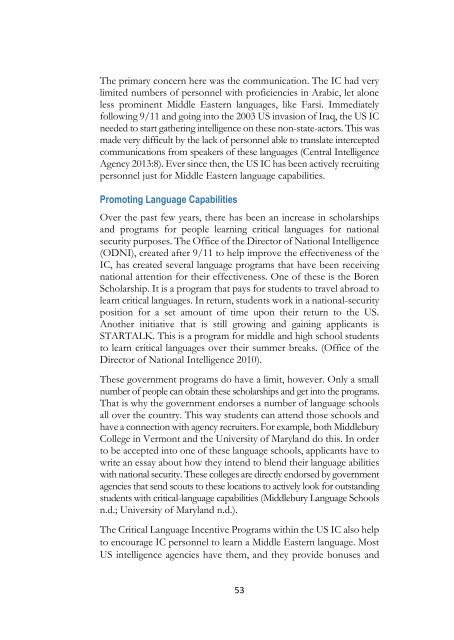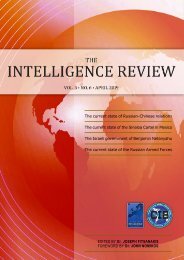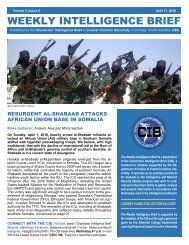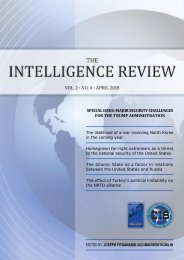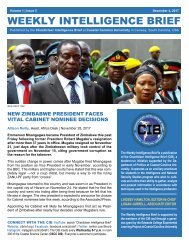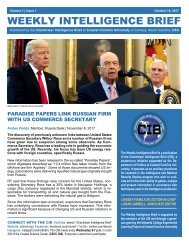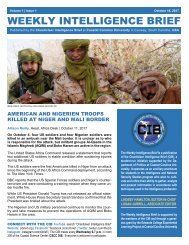The Intelligence Review | volume 3 | issue 5 |
This volume is the product of a collaboration between the European Intelligence Academy (EIA) and the Chanticleer Intelligence Brief (CIB), a pre-professional body supported by the Department of Politics at Coastal Carolina University in Conway, South Carolina, United States. Six CIB analysts tackle some of the most pressing and timely questions confronting intelligence observers today. Topics in this issue include the current and projected strength of the al-Shabaab militant group in East Africa, the future of the Iran nuclear agreement, and the current state of Mexico’s drug cartels. The issue also contains an analysis of the rising tension between the European Union and the government of Poland, as well as of the complex relationship between the United States and Cuba. The compendium concludes with an eye-opening report on the state of Middle Eastern linguistics in the United States Intelligence Community in the post-9/11 era.
This volume is the product of a collaboration between the European Intelligence Academy (EIA) and the Chanticleer Intelligence Brief (CIB), a pre-professional body supported by the Department of Politics at Coastal Carolina University in Conway, South Carolina, United States. Six CIB analysts tackle some of the most pressing and timely questions confronting intelligence observers today. Topics in this issue include the current and projected strength of the al-Shabaab militant group in East Africa, the future of the Iran nuclear agreement, and the current state of Mexico’s drug cartels. The issue also contains an analysis of the rising tension between the European Union and the government of Poland, as well as of the complex relationship between the United States and Cuba. The compendium concludes with an eye-opening report on the state of Middle Eastern linguistics in the United States Intelligence Community in the post-9/11 era.
You also want an ePaper? Increase the reach of your titles
YUMPU automatically turns print PDFs into web optimized ePapers that Google loves.
<strong>The</strong> primary concern here was the communication. <strong>The</strong> IC had very<br />
limited numbers of personnel with proficiencies in Arabic, let alone<br />
less prominent Middle Eastern languages, like Farsi. Immediately<br />
following 9/11 and going into the 2003 US invasion of Iraq, the US IC<br />
needed to start gathering intelligence on these non-state-actors. This was<br />
made very difficult by the lack of personnel able to translate intercepted<br />
communications from speakers of these languages (Central <strong>Intelligence</strong><br />
Agency 2013:8). Ever since then, the US IC has been actively recruiting<br />
personnel just for Middle Eastern language capabilities.<br />
Promoting Language Capabilities<br />
Over the past few years, there has been an increase in scholarships<br />
and programs for people learning critical languages for national<br />
security purposes. <strong>The</strong> Office of the Director of National <strong>Intelligence</strong><br />
(ODNI), created after 9/11 to help improve the effectiveness of the<br />
IC, has created several language programs that have been receiving<br />
national attention for their effectiveness. One of these is the Boren<br />
Scholarship. It is a program that pays for students to travel abroad to<br />
learn critical languages. In return, students work in a national-security<br />
position for a set amount of time upon their return to the US.<br />
Another initiative that is still growing and gaining applicants is<br />
STARTALK. This is a program for middle and high school students<br />
to learn critical languages over their summer breaks. (Office of the<br />
Director of National <strong>Intelligence</strong> 2010).<br />
<strong>The</strong>se government programs do have a limit, however. Only a small<br />
number of people can obtain these scholarships and get into the programs.<br />
That is why the government endorses a number of language schools<br />
all over the country. This way students can attend those schools and<br />
have a connection with agency recruiters. For example, both Middlebury<br />
College in Vermont and the University of Maryland do this. In order<br />
to be accepted into one of these language schools, applicants have to<br />
write an essay about how they intend to blend their language abilities<br />
with national security. <strong>The</strong>se colleges are directly endorsed by government<br />
agencies that send scouts to these locations to actively look for outstanding<br />
students with critical-language capabilities (Middlebury Language Schools<br />
n.d.; University of Maryland n.d.).<br />
<strong>The</strong> Critical Language Incentive Programs within the US IC also help<br />
to encourage IC personnel to learn a Middle Eastern language. Most<br />
US intelligence agencies have them, and they provide bonuses and<br />
53


